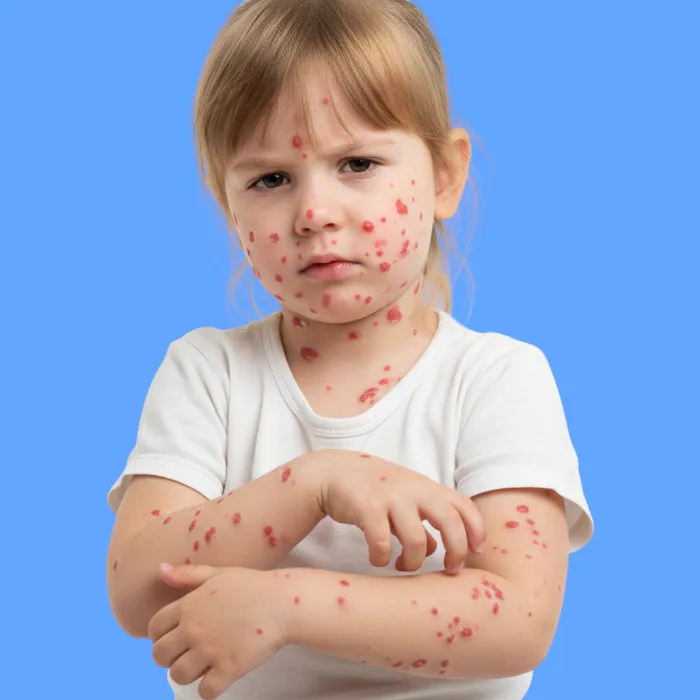What is chickenpox?
Chickenpox is a highly contagious viral infection that mostly affects children and causes a distinctive skin rash made up of small red fluid-filled blisters.
The disease spreads easily from person to person through droplets or direct contact with the blisters, It usually leaves lifelong immunity after recovery and is generally mild in children, but can be more serious in adults or those with weakened immune systems.
What causes chickenpox infection?
Chickenpox is caused by exposure to the varicella zoster virus (VZV), and the infection can spread in several ways, including:
- Inhaling droplets from a cough or sneeze of an infected person
- Touching the blisters or the fluid inside them
- Sharing personal items like towels or clothes
- Being in closed spaces with an infected person
- Having a weakened immune system
- Not receiving the chickenpox vaccine
- Contact with infected children in schools or nurseries
What are the common symptoms of chickenpox?

Symptoms usually appear 10 to 21 days after exposure to the virus and develop gradually. They include:
- Fever
- Feeling tired and fatigued
- Loss of appetite
- Skin rash starting as red spots then turning into blisters
- Intense itching
- Blisters spreading from the face and chest to the rest of the body
- Mild swelling of lymph nodes
When should you see a doctor?
Although chickenpox often resolves on its own, some cases require medical attention, such as:
- Fever lasting more than 4 days
- Signs of infection in blisters like pus or severe redness
- Difficulty breathing or persistent coughing
- Severe headache or neck pain
- Continuous vomiting or dehydration
- Rash appearing in the eyes or inside the mouth
- Infection in infants or immunocompromised individuals
- No improvement after one week
What are the treatment options for chickenpox?
Treatment focuses on relieving symptoms and preventing complications. It includes simple steps such as:
- Complete rest at home
- Taking fever reducers like paracetamol
- Using soothing creams for itching
- Avoiding scratching to prevent secondary infections
- Drinking plenty of fluids
- Wearing comfortable cotton clothes
- Trimming nails to reduce skin damage
- Using antiviral medications in severe cases
Can chickenpox be cured?
Yes, full recovery from chickenpox is possible in most cases, especially in healthy children.
The healing period usually lasts between 7 to 10 days and varies depending on age and overall health condition.
What are the prevention tips for chickenpox?
Prevention focuses on reducing exposure to the virus, especially in crowded places. Tips include:
- Getting the chickenpox vaccine
- Avoiding contact with infected individuals
- Washing hands regularly
- Not sharing personal items
- Ventilating closed spaces
- Teaching children not to scratch blisters
- Monitoring symptoms early
- Isolating the infected person until the rash disappears
What are the possible complications of chickenpox?
Although the disease is usually mild, some cases may develop complications, such as:
- Bacterial skin infections
- Pneumonia
- Encephalitis
- Liver or kidney problems
- Permanent skin scars
- Reye's syndrome (rare and serious)
- Eye or ear infections
Frequently asked questions about chickenpox
Is chickenpox contagious?
Yes, it spreads easily from person to person.
How long does the infection last?
From two days before the rash appears until the blisters dry out.
Can adults get chickenpox?
Yes, and it tends to be more severe in adults.
Can someone get chickenpox twice?
Very rarely, as the body usually builds lifelong immunity.
Article summary
Chickenpox is a common viral disease that mainly affects children and causes a distinctive skin rash. It usually heals on its own, but symptoms should be monitored to avoid complications, especially in vulnerable groups.
Prevention is possible through vaccination and avoiding exposure. It's recommended to consult a doctor if unusual symptoms appear.